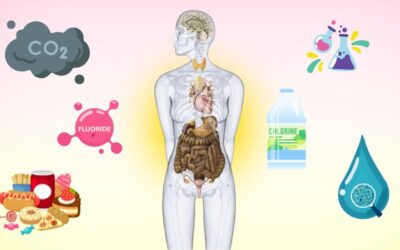Over the past century, the typical Western diet has seen a significant shift in the types of fats consumed. Traditional diets, rich in saturated fats from animal sources, have been replaced by diets high in polyunsaturated fatty acids (PUFAs), especially those from vegetable oils. These oils include canola, peanut, soybean, safflower, grapeseed, sunflower, corn, cottonseed, sesame seed, and rice bran oil.
This change was driven by the belief that saturated fats were harmful to cardiovascular health—a notion that recent research has increasingly challenged and debunked.
The impact of this dietary shift has been profound. Life expectancy in the United States declined for the third consecutive year in 2022, a trend not seen since World War I, according to the CDC. At the same time, chronic diseases like diabetes, heart disease, and cancer are on the rise. The CDC reports that 6 in 10 U.S. adults have a chronic disease, and 4 in 10 have two or more.
Obesity rates have also soared. Data from the National Health and Nutrition Examination Survey (NHANES) shows that adult obesity prevalence increased from 30.5% in 1999-2000 to 42.4% in 2017-2018. These statistics paint a concerning picture of public health in the United States, raising the question: Could changes in our dietary fat intake be a contributing obesity factor?
The Keto Craze

The “Keto Diet Craze” entered the scene in the early 2000s, where sugar was demonized and fat was king.
It proved not to be the solution for many people because they were eating all fats– the good and the bad – during a time when liver function was declining due to modern-day toxicity. The liver is where fat is metabolized; if the liver isn’t working, fat isn’t converted into energy. This issue is compounded when the fats are rancid unstable PUFAs packaged in “healthy” processed foods.
Sugar was taking the blame for all metabolic diseases, and the blame was partially correct. The amount of sugar has increased over the years; according to data from various sources, including the USDA, the average American consumed about 123 pounds of sugar annually in 1970. By the 21st century, this number had increased to around 152 pounds per year. This rise in sugar consumption is closely linked to the increase in obesity rates, diabetes, and other metabolic disorders observed over the same period.
However, “sugar” isn’t the same as it was in 1970; most sugar is consumed alongside highly unstable seed oils, artificial ingredients, toxins, heavy metals, and GMOs all packaged in the delivery system called “Processed Foods.” This creates a “firestorm” in the body with exponentially more detrimental effects than pure cane sugar alone.
The Role of Dietary Fats in the Body

Understanding why the type of fat we consume matters requires looking at the various roles dietary fats play in our bodies. They are far more than just an energy source; fats are crucial to numerous bodily functions and structures.
- Energy Source: Fats are the most energy-dense macronutrient, providing 9 calories per gram compared to 4 calories per gram for carbohydrates and proteins.
- Structural Components: Fats are essential parts of our cells, influencing their fluidity and function. The type of fat in our diet can directly affect the composition and health of our tissues.
- Hormone Production: Many hormones are derived from cholesterol, a type of lipid. Adequate fat intake is necessary for proper hormone production and balance.
- Nutrient Absorption: Certain vitamins—A, D, E, and K—are fat-soluble, meaning they require fat for absorption and transportation in the body.
- Signaling Molecules: Dietary fats can act as signaling molecules, influencing various metabolic processes in the body.
By understanding these roles, we can see how the quality and type of fat in our diet can significantly impact our overall health.
How Dietary Fats Impact Your Metabolic Rate
The types of fats you consume can significantly influence your metabolic rate. The ratio of polyunsaturated fatty acids (PUFAs) to saturated fats in your diet can affect how your body functions at a metabolic level.
Research suggests that diets higher in PUFAs and monounsaturated fatty acids (MUFAs) compared to saturated fats may send different signals to the body. Specifically, a higher intake of PUFAs and MUFAs may trigger hibernation-like responses, leading to:
- Lower metabolic rate
- Increased reductive stress
- Increased fat gain
Here are three key health challenges associated with high-PUFA diets:
- PUFA Oxidation and Toxic Byproducts: PUFAs are particularly vulnerable to oxidation due to their chemical structure, which contains two or more double bonds. The carbon atoms between these double bonds are susceptible to oxidation at physiological temperatures, leading to the production of toxic and inflammatory byproducts.
“PUFAs are like delicate glass. When glass shatters, it leaves behind dangerous shards. Likewise, when PUFAs shatter, they leave behind shards (aldehydes), capable of damaging proteins, DNA, and other critical cellular components.” (Chris Masterjohn)
Oxidative stress can seriously damage your mitochondria, the powerhouses of your cells that are crucial for energy production. This damage is a big deal because healthy mitochondria are essential for overall well-being.
However, just trying to eliminate oxidative stress isn’t enough. The real key is to focus on enhancing mitochondrial function. When your mitochondria are working optimally, they can better handle oxidative stress, produce more energy, and support various bodily functions more effectively.
By prioritizing mitochondrial health, you can address many health issues at their root. Think of it as not just putting out the fire but also reinforcing the structure so it can withstand future challenges. So, while combating oxidative stress is important, boosting your mitochondrial function is where the real magic happens.
2. Interference with Thyroid Hormone Utilization: PUFAs have been shown to interfere with thyroid hormone utilization, potentially slowing down the metabolic rate. The thyroid gland produces hormones that regulate metabolism, and any disruption can have wide-ranging effects on overall health.
A 2020 study published in the “Journal of Nutritional Biochemistry” found that high-PUFA diets can suppress thyroid function by interfering with the binding of thyroid hormones to their receptors. This can lead to symptoms of hypothyroidism, such as weight gain, fatigue, and cold intolerance, even if thyroid hormone levels appear normal in blood tests.
3. Impairment of Gut Health: The gut microbiome plays a crucial role in overall health, and dietary fats can significantly influence gut health. High-PUFA diets have been linked to increased gut permeability, dysbiosis, and inflammation.
A 2019 study published in “Nature Communications” found that diets high in omega-6 PUFAs promoted intestinal inflammation and increased the risk of inflammatory bowel diseases. The researchers observed that these fats altered the composition of the gut microbiome and increased the production of pro-inflammatory molecules.
4. Linked to Chronic Diseases: The shift towards high consumption of seed oils correlates with rising rates of obesity, diabetes, and heart disease. These oils are often found in processed and fast foods, which are already loaded with other unhealthy ingredients.
5. Nutrient Deficiency: Relying heavily on seed oils means you might be missing out on healthier fats like those from olive oil, coconut oil, and animal fats, which provide essential nutrients and support better health outcomes.
By understanding the impact of different types of fats on your metabolic rate and overall health, you can make more informed dietary choices that support better metabolic function and overall well-being.
Supplements to Combat Seed Oils and Support Mitochondrial Health
Acceleradine® Iodine
If you’re among the 96% of the U.S. population affected by iodine deficiency, Acceleradine® Iodine can be a game-changer. Iodine is vital for mitochondrial function and ATP production, and a deficiency can lead to a sluggish metabolism, poor detoxification of seed oils, and weight gain.
Why You Need Iodine:
- Optimal Thyroid Function: Iodine is crucial for producing thyroid hormones (T2, T3, and T4). Unfortunately, modern diets don’t provide enough iodine, and even iodized salt isn’t sufficient. Plus, iodized salt can deplete minerals and may be contaminated with microplastics.
- Boosts ATP Production: Iodine significantly increases ATP production in mitochondria, enhancing energy levels and supporting a more active metabolism.
- Cellular Detoxification: Iodine helps detoxify cells from heavy metals, toxins, and radiation, which can hinder mitochondrial function, metabolism, and weight loss.
- Displaces Harmful Substances: Iodine removes harmful substances like fluoride, chlorine, and bromide from cells, which are known to contribute to hypothyroidism, reduced ATP, and a sluggish metabolism.
- Prevents Toxic Overload: High-dose iodine prevents new toxins from binding to cells’ receptor sites, protecting against negative effects.
- Mitigates Spike Protein Damage: Iodine may help alleviate the damage caused by the Spike Protein, which is linked to mitochondrial damage, metabolic slowdowns, and weight gain.
- Blood Cleansing and Hormonal Balance: Iodine helps cleanse the blood, supports liver detoxification, and regulates estrogen, promoting hormonal balance and reducing estrogen dominance.
- Strengthens the Cell Membrane: Iodine is also crucial for forming iodolipids, which play roles in maintaining and regulating cell membrane health. These iodolipids, supported by iodine and Phosphatidylcholine, help keep the cell membranes at the perfect balance—ensuring they’re neither too rigid nor too fluid, but just right. When cell membranes are healthy and balanced, cells can communicate better, absorb nutrients more efficiently, and dispose of waste like seed oils effectively.
This balance is vital for everything from brain function to metabolic processes. In essence, iodolipids enhance the performance of cell membranes. By integrating iodine into the lipid structure of the membranes, we give them the ability to operate at peak efficiency. It’s like using high-quality oil in an engine—it keeps everything running smoothly and efficiently.
BodyBio PC (Phosphatidylcholine)
If you’re concerned about the negative impact of seed oils on your health, understanding the role of phosphatidylcholine can be a game-changer. Here’s why this nutrient is essential in combating the dangers posed by seed oils.
Protects and Repairs Cell Membranes
Seed oils, which are high in polyunsaturated fats (PUFAs), can cause oxidative damage to cell membranes. Phosphatidylcholine is a vital component of cell membranes and plays a crucial role in maintaining their integrity. It helps to repair damaged membranes, ensuring that your cells function optimally and are protected from the harmful effects of seed oils.
Enhances Liver Detoxification
Your liver is a detox powerhouse, but it can become overwhelmed by the byproducts of seed oils, such as aldehydes, which are toxic and inflammatory. Phosphatidylcholine supports liver function by enhancing its ability to detoxify harmful substances. This means your liver can more effectively process and eliminate the toxins from seed oils, reducing their impact on your overall health.
Supports Brain Health
Seed oils can contribute to inflammation and oxidative stress in the brain, leading to cognitive decline and other neurological issues. Phosphatidylcholine is crucial for brain health because it is a major component of brain cell membranes and is involved in the production of acetylcholine, a neurotransmitter essential for memory and learning. By incorporating phosphatidylcholine into your diet, you can help protect your brain from the damaging effects of seed oils.
Boosts Mitochondrial Function
The oxidative stress caused by seed oils can impair mitochondrial function, leading to reduced energy production. Phosphatidylcholine supports mitochondrial health by maintaining the structure and function of mitochondrial membranes. This ensures that your cells can produce the energy they need to keep you feeling energized and healthy.
Reduces Inflammation
Seed oils are notorious for promoting inflammation due to their high omega-6 content. Phosphatidylcholine has anti-inflammatory properties that can help counteract this effect. By reducing inflammation, phosphatidylcholine helps protect your body from the chronic diseases associated with high seed oil consumption, such as heart disease, obesity, and diabetes.
Improves Fat Metabolism
Phosphatidylcholine aids in the metabolism of fats, helping your body to process and utilize them more efficiently. This is particularly important if you’re trying to combat the weight gain and metabolic slowdowns often associated with seed oil consumption. By supporting healthy fat metabolism, phosphatidylcholine can help you maintain a healthy weight and optimize your energy levels.
BodyBio PC is genuinely liposomal, ensuring that the phosphatidylcholine (PC) stays intact through digestion and effectively reaches your cells without breaking down. This guarantees optimal delivery and absorption.
While other brands claim to be liposomal, many don’t meet the mark. The real proof is in the results, and for decades, we’ve witnessed remarkable outcomes with BodyBio PC, showcasing its superior efficacy.
Accelerated Fast™
Accelerated Fast™ is more than just a metabolism booster and fat burner; it ramps up ATP production, aiding in cellular health and detoxifying the liver. A clean liver is crucial for converting T4 to the active T3 thyroid hormone, promoting thyroid health, ATP production, and fat metabolism.
Why Accelerated Fast™ Stands Out:
- Curbs Cravings: The ingredients help curb cravings for processed foods with seed oils, which can drain ATP levels and slow metabolism. By pushing your body into ketosis, they help you tap into fat stores for energy, providing a steady and sustainable energy source.
- Optimizes Thyroid Hormone Conversion: Promoting ketosis and optimizing thyroid hormone conversion keeps your metabolism running smoothly and supports overall well-being.
- Prevents Metabolic Slowdown: The formula helps keep your metabolism running smoothly by promoting ketosis and optimizing thyroid hormone conversion, preventing your body from going into survival mode and lowering ATP production.
Accelerated Thyroid®
Accelerated Thyroid® is a cutting-edge natural thyroid supplement designed to comprehensively boost thyroid function. A healthy thyroid is essential for ATP and mitochondrial health. The formula combines grass-fed thyroid glandular, essential peptides, amino acids, and crucial nutrients for thyroid health, including the ancient Ayurvedic herb Kanchanara, known for its detoxifying and thyroid-supporting properties.
Benefits of the Ingredients:
- Prevents Fatty Liver: Supports metabolism and aids in weight loss.
- Accelerates Wound Healing: Promotes faster recovery.
- Strengthens Connective Tissue and Bones: Enhances structural integrity.
- Elevates Mood: Boosts overall outlook.
- Improves Digestion: Optimizes nutrient absorption.
- Enhances B12 Production: Supports overall health and vitality.
Dietary Hacks for Better Overall Health
Educate Yourself About Protein
Most people recognize protein is good for them, but the “wrong” protein can carry the wrong nutrients that may backfire. Proteins like chicken, turkey, pork, and conventionally raised beef have higher levels of the inflammatory omega-6 fatty acids, including linoleic acid, that are just like the fats that come from seed oils.
Additionally, these meats have amyloid proteins, which are misfolded, that not only don’t get broken down into usable amino acids, but also trigger gut pathogens to proliferate, and find their way into the brain causing cognitive decline. These amyloids have become a more serious issue since the Spike Protein has infiltrated all of our bodies.
On the other hand wild animal protein is full of nutrients, usable amino acids, and a higher amount of omega-3 fatty acids. These meats include bison, lamb, venison, elk, and wild fish. These proteins should be the priority in one’s diet for optimal health and longevity.
Protein Boosts Mitochondrial Health
Proteins are crucial for keeping our mitochondria—the powerhouses of our cells—in top shape. They provide structural support and are essential for building and maintaining the mitochondria’s outer and inner membranes. Proteins like cytochrome c and ATP synthase are vital for the electron transport chain and ATP production. They also play a significant role in repairing damaged mitochondria, ensuring efficient functioning. When we consume protein, it breaks down into amino acids necessary for making new mitochondrial proteins, directly boosting ATP production and enhancing overall energy levels.
Additionally, proteins support mitochondrial biogenesis, the process of creating new mitochondria, by involving transcription factors like PGC-1α, which turn on genes related to energy metabolism. Proteins also act as antioxidants, neutralizing harmful reactive oxygen species (ROS) produced during ATP production, protecting mitochondria from damage. Detoxifying proteins remove harmful substances that could impair mitochondrial function. Overall, proteins help maintain a balance in cellular activities, ensuring efficient energy production and optimal mitochondrial health.
Use Healthy Oils
Switching out seed oils for healthier options like butter, ghee, olive oil, and avocado oil can make a big difference in your diet. These healthier oils provide essential nutrients and beneficial fats without the harmful effects associated with seed oils. Here’s why they’re better choices:
- Butter and Ghee: These traditional fats are rich in saturated fats, which are more stable at high temperatures, making them great for cooking. They also contain beneficial nutrients like vitamin K2, which supports bone and heart health, and butyrate, which promotes gut health.
- Olive Oil: Known for its high content of monounsaturated fats and antioxidants, olive oil is excellent for heart health and reducing inflammation. Extra virgin olive oil, in particular, retains more nutrients and has a robust flavor that’s perfect for dressings and low-heat cooking.
- Avocado Oil: With a high smoke point and a healthy mix of monounsaturated fats, avocado oil is versatile and ideal for high-heat cooking. It’s also packed with vitamins like E and antioxidants that support overall health and skin wellness.
Incorporating these oils into your diet can enhance your meals with healthier fats, support your body’s nutritional needs, and reduce the risk of the negative effects associated with seed oils.
Eliminate Processed Foods
Processed foods can severely limit ATP production, reducing it to just 2 ATP per mitochondrion, compared to the optimal 36 per mitochondrion. These foods create excess “waste,” which halts mitochondrial biogenesis and overwhelms the body’s cleanup efforts. This waste bogs down the entire system, resulting in less ATP, decreased mitochondrial biogenesis, dirtier mitochondria, and less energy at the cellular level.
Eliminate PUFAs
Polyunsaturated fats (PUFAs) are everywhere—found in processed foods, imitation butter, salad dressings, fried foods, poultry, pork, nuts, seeds, seed oils, and fatty fish. These include oils like safflower, grapeseed, sunflower, corn, cottonseed, soybean, rice bran, peanut, and canola. The biggest culprit is linoleic acid (LA). These fats can mess with your metabolism, harm your mitochondria, and contribute to fat gain, heart disease, obesity, diabetes, insulin resistance, Alzheimer’s, and Parkinson’s disease.
PUFAs have multiple double bonds in their carbon chains, unlike saturated fats. This structure makes them fragile and prone to becoming inflammatory compounds, damaging mitochondria, and impairing ATP and energy production. They also inhibit fatty acid beta-oxidation, making your body less efficient at using fat for fuel and leading to larger fat cells. Even worse, these fats stay in your body for up to six years, continuously disrupting your metabolism.
Reduce the Wrong Estrogen
Bad estrogen or estrogen dominance, can mess with your mitochondria, the powerhouses of your cells that generate energy. These “bad estrogens” can be found in plastics, makeup, cookware, cleaning supplies, and more. They increase the “bad” estrogen in the body.
When your body has too much estrogen, it creates a hormonal imbalance that impacts your cellular health, including your mitochondria. Excess estrogen can lead to increased oxidative stress. This means more free radicals are produced, which can damage the mitochondrial membranes and impair their function. When mitochondria are damaged, they can’t produce ATP efficiently, leaving you feeling tired and sluggish.
Moreover, high levels of estrogen can interfere with the natural balance of other hormones like progesterone and thyroid hormones, both of which are crucial for mitochondrial health. Progesterone supports mitochondrial function, while thyroid hormones are essential for energy production. When estrogen is too high, it throws these hormones off balance, further hampering your mitochondria’s ability to produce energy.
Bad estrogen also promotes inflammation, which can lead to chronic conditions that strain your mitochondria. Inflammation creates a hostile environment for these tiny energy producers, leading to more damage and less efficient energy production. In a nutshell, estrogen dominance disrupts your body’s balance, increases oxidative stress, and promotes inflammation, all of which are detrimental to your mitochondrial health. Keeping your estrogen levels in check is crucial for maintaining optimal energy production and overall well-being.
Mitigate Endotoxins
Endotoxins, those nasty toxins released by harmful bacteria in your gut can wreak havoc on your mitochondria. They are worsened when eating a diet full of seed oils and grains. When your gut lining is compromised, these endotoxins leak into your bloodstream, triggering inflammation throughout your body. This inflammation damages your mitochondria.
When mitochondria are under attack by endotoxins, their ability to produce ATP (the energy currency of your cells) is severely compromised. This means less energy for your body to function properly, leading to fatigue and other health issues. Additionally, the damage caused by endotoxins can impair mitochondrial biogenesis, the process by which new mitochondria are formed. Without healthy, functioning mitochondria, your body struggles to maintain energy levels, and overall cellular health deteriorates.
Avoid Sulfur-Rich Vegetables
Skip sulfur-rich veggies because they can overload your body’s detox pathways, slowing down your metabolism, ATP production, and fat burning, while increasing inflammation. This means saying no to broccoli, cauliflower, cabbage, kale, onions, garlic, and egg yolks. Watch out for hidden sulfur in medications and supplements too. After healing your gut, you may be able to incorporate some of these foods in moderation.
Eliminate Oxalate-Rich Foods
Remove oxalate-heavy foods from your diet, such as spinach, almonds, berries, kale, and most nuts. Oxalates can slow down your thyroid function, which in turn slows down ATP production, metabolism, and fat burning.
Reduce Histamine-Rich Foods
Avoid high-histamine foods to reduce the histamine load on your body. This helps your digestive system heal and supports better insulin regulation, reduces inflammation, and allows for better mitochondrial function.
Exercise Regularly
Physical activity stimulates the production of new mitochondria and enhances their function in addition to accelerating the detoxification of things like seed oils. High-intensity interval training (HIIT) and strength training are particularly effective.
Avoid Toxins
Limit exposure to environmental toxins like pesticides and heavy metals, which can damage mitochondria. Choose organic foods and use natural cleaning products when possible.
Stay Hydrated
Water is essential for all cellular processes, including those in mitochondria. Ensure you’re drinking enough water daily.
Get Enough Sleep
Sleep is when your body repairs and recharges. Lack of sleep can disrupt energy production and lead to fatigue and poor health.
Manage Stress
Chronic stress can deplete your energy reserves. Stress also lowers thyroid health and metabolism, which will degrade mitochondrial function and ADP production. Practices like mindfulness, meditation, and relaxation techniques can help maintain a healthy balance.
Sara Banta
Sara Banta is a Stanford University Graduate with a Degree in Economics and Psychology, and a certified Natural Supplement Expert & Graduate of the Institute for Integrative Nutrition. Sara is the Founder of Accelerated Health Products and host of the health & wellness podcast, Accelerated Health Radio.
- Sara Bantahttps://sarabantahealth.com/author/sarabanta/
- Sara Bantahttps://sarabantahealth.com/author/sarabanta/
- Sara Bantahttps://sarabantahealth.com/author/sarabanta/
- Sara Bantahttps://sarabantahealth.com/author/sarabanta/









